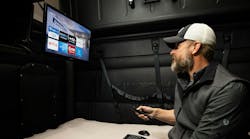Name: Bill Gordon
Equipment
Tractor: 1998 Kenworth T600 with 120-in.
ITC custom sleeper. Caterpillar 550-hp. engine; Eaton Super 13 transmission
Trailer: Kentucky 53-ft. tri-axle
It's been a great life, just great,” says Bill Gordon. “I have absolutely no regrets.” He's speaking via his cell phone from the beach on St. Thomas in the American Virgin Islands, where he's been vacationing with five other truck operators and their spouses. “We try to take a vacation like this once a year,” he says.
Gordon's success story, like those of many others in the trucking industry, is a story about hard work paying off — not a story about luck. Although Gordon, who actually began his working life as an executive chef, would be the first to tell you he counts himself as fortunate indeed.
Since 1975, he has been leasing his services and his truck to North American Van Lines Inc. [now owned by CD & R Investment Group (Clayton, Dubilier & Rice)] one way or another. Today, that means working through one of the company's agents, Clinton's Transfer and Storage, Blacksburg, Va. “My boss, Clinton Graves, is the greatest person I've ever known,” says Gordon. “He is 75 years old, but he's the first one in the office in the morning and the last one out. When I went to work for him, he said, ‘Do a good job and be safe. If you have to choose between making more revenue or keeping our quality up, always focus on maintaining quality service.’”
This is advice Gordon has obviously taken to heart. “Moving is a very stressful thing for people,” he says. “Everything that matters to them is in my trailer, from the antiques their grandmother left them to the pictures of their kids. I tell customers, ‘Show me what you care about the most, and I'll take extra special care of those things myself.’”
As a result of his personal commitment to service and safety, Gordon has twice been recognized by the American Moving and Storage Assn. (AMSA) as Operator of the Year; he has also received the group's Lifetime Achievement Award. “I was one of the youngest drivers ever to receive it,” he recalls. “It's a tremendous honor.”
Gordon's efforts have also earned him financial success beyond what many owner-operators achieve. “I've been averaging about $200,000 per year,” he says. “Part of my income comes from the actual driving, but I also get paid for extra services like packing and unpacking, moving things up stairs or shuttling goods long distances from the trailer to the house, etc.
“The most important thing about trucking for a living, however, is to treat it as a business, not a job,” he explains. “I don't work for my boss. I work for myself. I have my own business.”
Among his biggest business challenges, Gordon numbers many of the same things that worry other owner-operators as well as fleets: fuel costs, insurance and workers' compensation, for instance. He puts technological changes, however, firmly on the positive side of the ledger. “Technology has had a tremendous effect on trucking,” he says. “Thanks to our satellite system, for instance, I can reach the dispatcher or any agent in the company within about ten seconds. In the old days, I had to park the truck, find a pay phone, call dispatch and then wait for them to call me back. Now even our customers can call in themselves to see exactly where we are. It gives them more peace of mind.”
At age 52, Gordon is still looking forward to many more years of driving. “My entire work and social life is out there on the road,” he says. “When you're a driver, your friends on the road take the place of knowing your neighbors. And I wouldn't trade it for anything.”
This new monthly column presents the independent contractor's perspective on working relationships with fleets and fleet managers.


